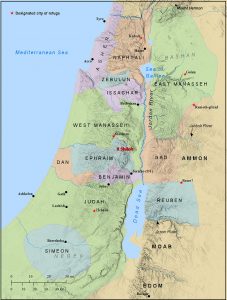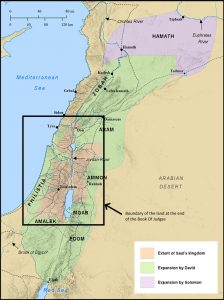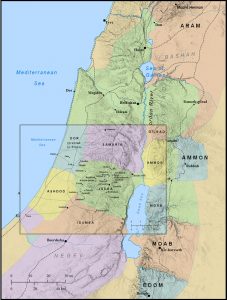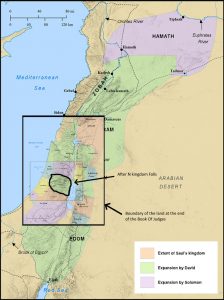United Kingdom (1102-982 B.C.)
- 1 and 2 Samuel, 1 Kings:1-12
- Three kings, Saul, David and Solomon, reigned, each of them about forty years.
Samuel
- (1 Sam 8)
- At the close of the Book of Judges it is noted that all the tribes of Israel ruled themselves and ‘ In those days Israel had no king; everyone did as they saw fit.’
- Samuel, the last and greatest of the Judges had two sons who followed him. They were unrighteous, perverted justice and took bribes. (1 Sam 8 : 4)
- The Israelites went to Samuel and demanded he anoint a king for them – like all the other nations. This displeases Samuel and he prays to God about it.
God notes it is not Samuel the Israelites are rejecting but Him.
As they have done from the day I brought them up out of Egypt until this day, forsaking me and serving other gods, so they are doing to you. 9 Now listen to them; but warn them solemnly and let them know what the king who will reign over them will claim as his rights. 1 Sam 8:8-9”
The people ignore the warnings, choose to reject God and declare they want a king.
Samuel as commanded by God anoints Saul to be king.
Saul
- Is a strong, tall handsome man.
- He has physical prowess, is a good fighter and leads Israel to victories
- He is flawed and proud and chooses to do things his way rather than Gods (1 Sam 15)
- God rejects him as king and says his children will not inherit the throne
Saul is the picture of what a worldly king should look like but shows very quickly that he is not a good leader for Israel.
David
- David, the youngest son of the family is a herder of sheep and goats
- While his brothers go to war he is left behind to run errands
- God tells Samuel to anoint him king – even though Saul is still alive (1 Sam 16 )
David is an ideal Godly king (in contrast to Saul)
- He doesn’t trust in his own strength (1 Sam 17)
- He trusts God and doesn’t take short cuts to power (1 Sam 24 and 1 Sam 18 – 23)
Eventually Saul dies and David is made king. During his kingship he:
- Sets up Jerusalem as the capital
- Brings the tabernacle to Jerusalem
- Prepares resources to build a temple for God
- Subdues his enemies
- Brings peace and prosperity to a united Israel
David too is a flawed man (2 Sam 11) – but his heart is faithful to God (righteous) and he is accepted by God and flourishes.
- God promises him his descendants will rule forever
- God blesses him
- God blesses his subjects
Solomon
Under Solomon a united Israel flourishes
- The kingdom expands until it fulfils the promise of God to Abram to be from :
- The River of Egypt (Red Sea) to the Euphrates,
- The sea through to the desert ( Genesis 15:17, Exodus 23:31 )
- The Temple is built in Jerusalem. It is a place of great worship to God and the centre of the Jewish faith
- The Psalms, Proverbs, Song of Solomon and other wisdom literature are written. Extravagant worship abounds
- The united kingdom prospers. There is so much wealth silver is considered worthless ( 1 kings 10:21 )
- Rulers come from all over the world to see for themselves the wealth, wisdom and beauty of the kingdom. ( 1 Kings 10 )
- Wisdom abounds. During this period art and architecture flourished, the government was firmly established.
- The armies are large and powerful. No enemy can dare conquer Israel. The land is safe
1 Kings 10 is a summation of the wealth and splendour of the kingdom under Gods blessings
1 Kings 11 starts with – “King Solomon, however, loved many foreign women …against the Lord’s commands … and they caused him to do evil and worship foreign gods and idols”
Solomon is flawed – and unrighteous and so God promises:
So the Lord became angry with Solomon because his heart had turned from the Lord God of Israel … Therefore the Lord said to Solomon, “Because you have done this, and have not kept My covenant and My statutes, which I have commanded you, I will surely tear the kingdom away from you and give it to your servant. Nevertheless, I will not do it in your days, for the sake of your father David; I will tear it out of the hand of your son.”
The kingdom is destined to be lost.
Divided Kingdom (982-722 B.C.)
- 1 and 2 Kings, Jonah, Isaiah
- In a little more than one hundred years the Kingdom arose, attained its zenith and went into decline. Under David and Solomon, the seeds were sown which were destined to yield disaster. When Rehoboam, the son of Solomon, came to the throne the Northern tribes raised the standard of revolt, set up a rival Kingdom and the split was permanent.
- During his coronation he was approached by the tribes who asked him to lighten the taxes Solomon had put upon them
- Rehoboam is councilled to be consilatory by the elders
- He is counciled to be harsh by his younger peers
- He listens to the younger peers and tells the tribes he will be even more harsh than his father.
- Jeroboham, a civil servant leads a rebellion and the northern tribes rebel
- 1 Kings 12:1-20
Northern Kingdom ( – 722 BC)
- 2 Kings : 1 – 17
The Northern kingdom is known as Israel.
- The northern kingdom is an unrighteous kingdom
- It consists of 10 of the 12 tribes of Israel
- There are 19 kings across approximately 260 years.
- All 19 kings are unrighteous
- The land they had under David and Solomon is lost
- There are fights against the southern kingdom. 10’s and 100s of thousands die in these wars
- Famine, harsh kings and raids ensure the kingdom never really propsers
- In 722 BC God sends the Assyrian army to conquer the land. They destroy the kingdom, plow the ground with salt, destroy the cities and kill most of the people
- They put foreigners to live in the conquered land which was called Samaria
- Some of the small remnant left intermarried. Thy became Samaritans – considered unclean by pious pure blooded Jews and traitors for marrying the enemy
A more complete history is found here : https://biblestudy.org.nz/12-steps-to-understanding-the-bible/6-kingdom/6-1-kingdom-details/6-2-kingdom-details-2/
Southern Kingdom (- 586 BC)
- 2 kings 18 – 25
The southern kingdom was known as Judah
- Judah is a more righteous kingdom than Israel
- Rehoboam, like his father Solomon worshipped idols
- There were 20 kings of Judah
- 8 king the kings were righteous and preserved Judah for longer
- The Babylonians captured Jerusalem in 586 BC and exported the leaders, musicians, artisans and promising young people to Babylonia
- They sent people from other lands to live in Judah
A more complete history is found here : https://biblestudy.org.nz/12-steps-to-understanding-the-bible/6-kingdom/6-1-kingdom-details/6-2-kingdom-details-2/
A genealogy of the kings of Israel and Judah
Can be found here: 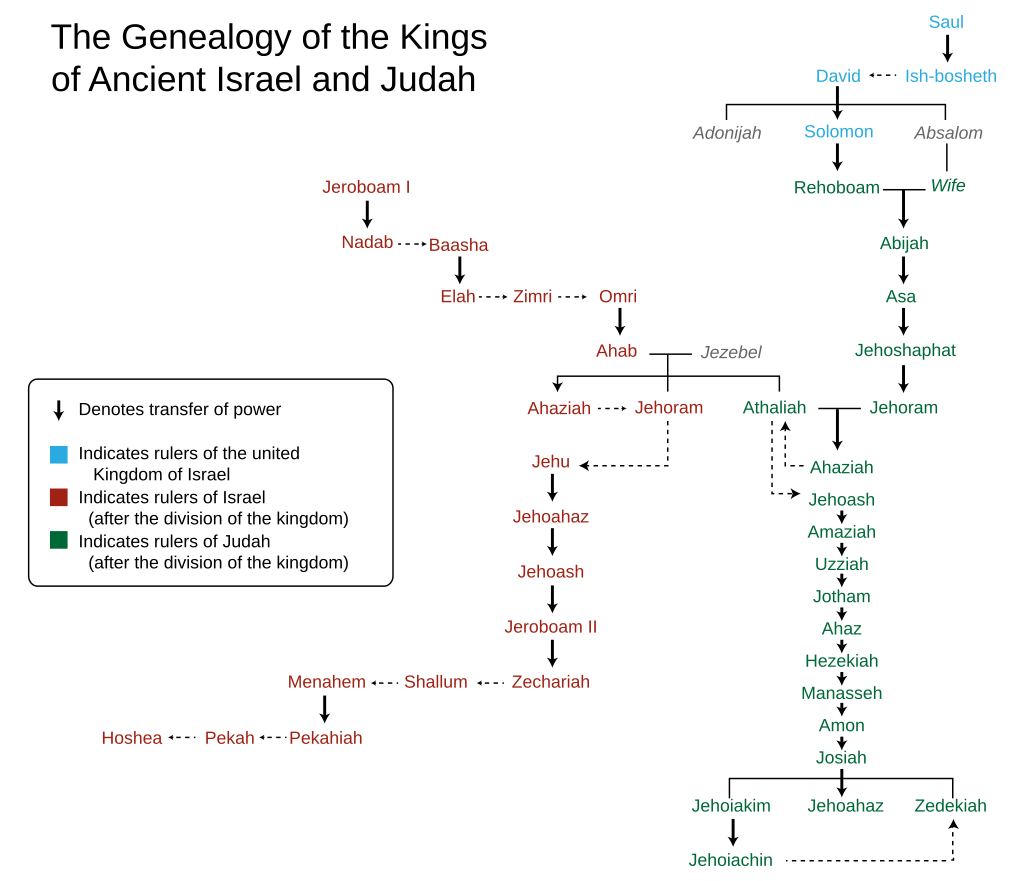
A summary of 2 Kings covering the period of the split kingdom
| THE DIVIDED KINGDOM: Israel and Judah |
REPRIVE OF JUDAH FALL OF JUDAH |
|||||
| Covenant | THE SINAI COVENANT | |||||
| Scripture | 1:1———–9:1—————17:1————18:1—————-22:1—————25:1——25:30 | |||||
| Division of Text | The Prophet Elisha succeeds the Prophet Elijah | Reign of 10 Kings of Israel & 8 kings of Judah
-Death of Elisha |
Siege, fall & exile of the 10 tribes of Northern Kingdom of Israel | Reign of good King Hezekiah & 2 bad kings |
Reign of good King Josiah & 4 bad kings |
Siege, fall & exile of the 2 tribes of Southern Kingdom of Judah |
| Topic | ISRAEL AND JUDAH | JUDAH | ||||
| Israel Kings: Ahaziah to HosheaJudah Kings: Jehoram to Ahaz |
Judah Kings: Hezekiah to Zedekiah |
|||||
| Location | Northern Kingdom of Israel Southern Kingdom of Judah Israel deported to Assyria |
Southern Kingdom of Judah Judah deported to Babylon |
||||
Maps of the kingdom over this period
